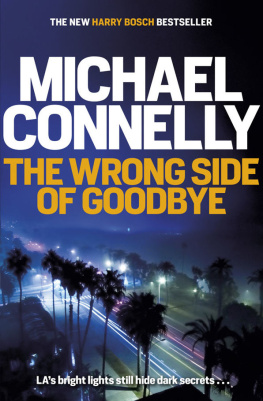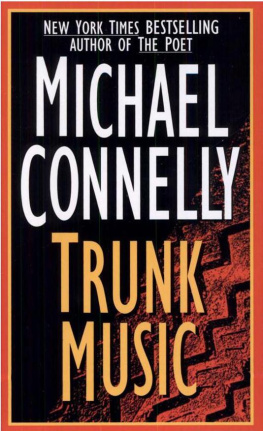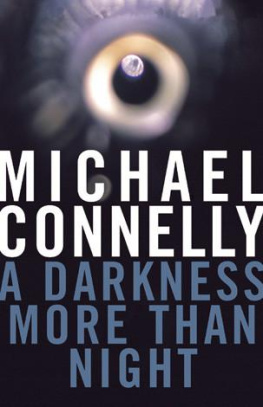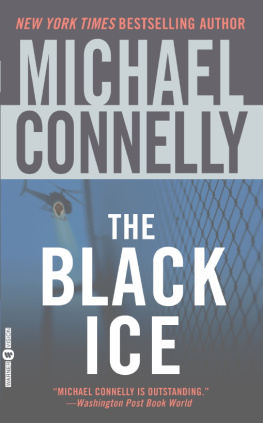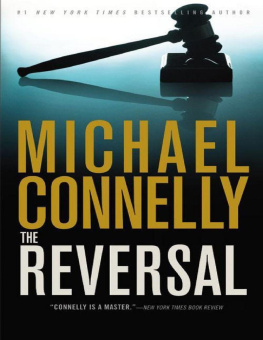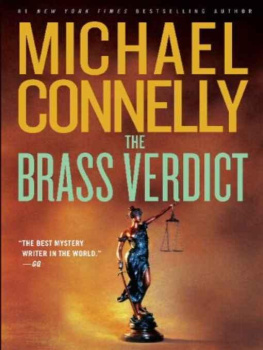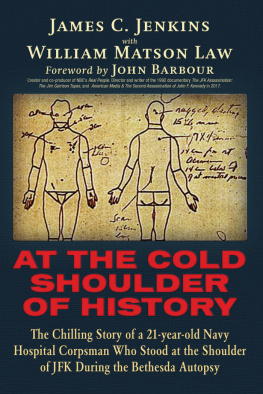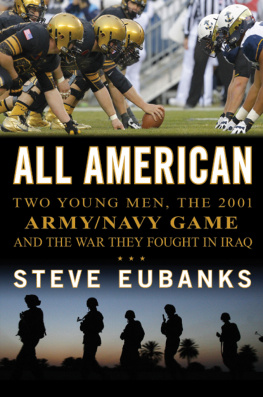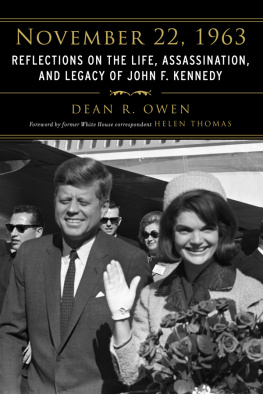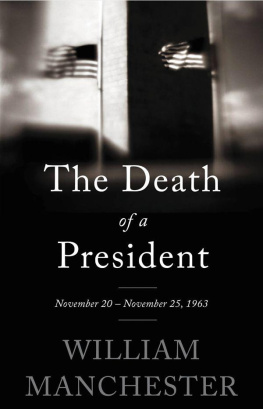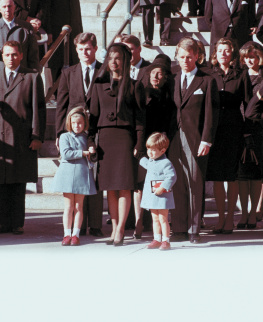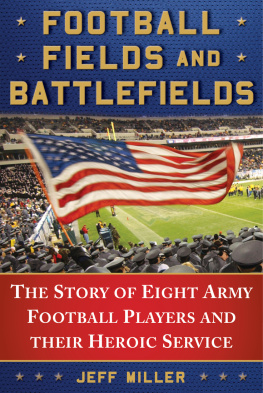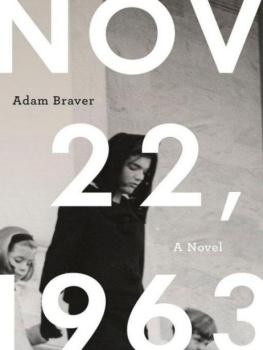THE PRESIDENTS TEAM
The 1963 ArmyNavy Game
and the Assassination of JFK
Michael Connelly
Foreword by
Senator Edward M. Kennedy
Afterword by
Roger Staubach and Admiral Tom Lynch

This book is dedicated to the members of the 1963 football programs at the United States Naval Academy and the United States Military Academy at West Point who made the ultimate sacrifice in defense of freedom and democracy, exemplifying the courage, honor, and valor of our military services: From Army, Mike Berdy, Gary Kadetz, and Bill Sipos; and from Navy, Michael Burns, Tom Holden, and Douglas McCarty.
To my beautiful wife, Noreen, whose smile still lights up a room; my son, Ryan, whom I thank God for every day; my mom and dad, who raised six children the old-fashioned waywith love and accountability; my brother and sisters, who arent just my siblings but my friends and are always there for me as I will be for them.
First published in 2009 by MVP Books, an imprint of MBI Publishing Company and the Quayside Publishing Group, 400 First Avenue North, Suite 300, Minneapolis, MN 55401 USA
Copyright 2009, 2010 by Michael Connelly
Hardcover edition published in 2009. Digital edition 2010.
All rights reserved. With the exception of quoting brief passages for the purposes of review, no part of this publication may be reproduced without prior written permission from the Publisher.
The information in this book is true and complete to the best of our knowledge. All recommendations are made without any guarantee on the part of the author or Publisher, who also disclaims any liability incurred in connection with the use of this data or specific details.
We recognize, further, that some words, model names, and designations mentioned herein are the property of the trademark holder. We use them for identification purposes only. This is not an official publication.
MVP Books are also available at discounts in bulk quantity for industrial or sales-promotional use. For details write to Special Sales Manager at Quayside Publishing Group, 400 First Avenue North, Suite 300, Minneapolis, MN 55401 USA.
To find out more about our books, visit us online at www.mvpbooks.com .
Digital edition: 978-1-61673-110-6
Hardcover edition: 978-0-7603-3762-2
Library of Congress Cataloging-in-Publication Data
Connelly, Michael (Michael P.)
The presidents team : the 1963 Army-Navy game and the assassination of JFK / Michael Connelly ; foreword by Senator Edward M. Kennedy ; afterword by Roger Staubach.
p. cm.
Includes index.
ISBN 978-0-7603-3762-2 (hb w/ jkt)
1. United States Naval AcademyFootballHistory. 2. United States Military AcademyFootballHistory. 3. Kennedy, John F. (John Fitzgerald), 19171963Assassination. 4. FootballUnited StatesHistory. I. Title.
GV958.U512C66 2009
796.332dc22 2009029021
Edited by Josh Leventhal and Chad Caruthers Designed by Diana Boger
Printed in the United States of America
Contents
Foreword
by Senator Edward M. Kennedy
WE ALL LOVED TO PLAY TOUCH FOOTBALL GROWING UP. From the time I could walk, we were playing football togetherand that included my sisters as well. We loved it, and some of my earliest memories are of those early games. Sports are such an important part of childhood, and in my family, we took it seriously. Nothing could equal the competition of some of our games of touch football on the Cape.
Jack and Bobby used to captain opposing teams. Neither liked to lose, let me tell you! The games were supposed to be touch, but I remember getting tackled in a lot of them.
My brothers Joe and Bobby played football at Harvard, and from the first game I saw them play, I knew I wanted to follow in their footsteps. Jack didnt play football at Harvard because of his back. He did play at Choate School and loved to be part of the touch football games we played on the Cape.
Bobby was an amazing player. He was terrific, and he lettered. Although he was smaller than a lot of the other players, he practiced harder, hit harder, and was more tenacious than any two other teammates put together. He would stay after practice and continue to work with Kennedy ODonnell, running plays until they became second nature to him. In his senior year Bobby started the first game and scored the only touchdown. A few days later he fractured his leg in practice but told no one. He kept on trying to play until he collapsed on the field. The injury knocked him out for the rest of the season, but the coach sent him in for his letter during the last moments of the Yale game even though his leg was in a cast. He was involved in the last play and fortunately didnt injure himself any further. After he graduated, he used to play on weekends with a semi-pro team on the Cape, just for the fun of it. He was sensational.
My brother Joe played for the varsity as well. He was an end, but not a starter. He was smaller than many of the other players, and although he was tough and agile, he was prone to injuries. He had to have his knee operated on as a result of one injury. Unfortunately, he was one of the seniors who did not get to play in the final Yale game, so he didnt get a letter. Harvard was ahead in the game, but because the coach, Dick Harlow, was afraid of a possible loss, he kept the starters in. This disappointed the team, who all wanted the nineteen seniors to get in the game, even if only for one play, to qualify for their letter. It was a tough day for all of them.
I played left end at Harvard, and I tell people thats where I learned my professional philosophy. I made many great friends on the team. The one memory that stands out for me is catching a touchdown pass in the Yale game. That was a real thrillespecially since my father and brothers were in the stands watching. It doesnt get any better than that!
Unfortunately, we didnt win the game. But Dad took us out to dinner, and we had a wonderful time catching up with each other and remembering our time at Harvard and other great games. It was a memorable day in so many ways.

My brother Jack was proud of his Navy service and certainly felt a great loyalty to the Navy and the lifelong friends he made there. He was always especially delighted to accept invitations to speak at the Naval Academy, and he always felt a special tie to the students who were soon to be officers under his command during the Cold War. I often think of his beautiful words to the new class of midshipmen at the ceremony in front of Bancroft Hall in the summer of 1963, when he told them, I can imagine no more rewarding career. And any man who may be asked in this century what he did to make his life worthwhile, I think can respond with a good deal of pride and satisfaction: I served in the United States Navy.
He loved to joke with them as well. At the end of that speech, Jack told them the story of the admiral whod pull out a piece of paper from his desk drawer every morning before he started his work. The paper said, Left-port; right-starboard. Jack told the young men, If you can remember that, your careers are assured.
My brother always admired excellence in any field, and athletics was no exception. He greatly enjoyed meeting Navy football stars Joe Bellino and Roger Staubach and Tom Lynch, and talking with them about football and their future as officers in the Navy. It was an enjoyable break in his otherwise busy day dealing with the needs of the nation.
As president, Jack had to remain neutral during the ArmyNavy games, since he was commander in chief of all the armed services. Traditionally, the president changes sides at halftime so he wont be seen as favoring one team over the other. I remember one year he was on the Army side for the first half and then walked across the field and was met at the 50-yard line by the Navy brass. He shook hands with the Army generals and West Point cadets who had accompanied him and then turned to walk with the Navy escort to his seat on the Navy side. A roar went up from the Midshipmen and the Navy supporters because they knew, as a former navy man, he was coming home, so to speak. He got an especially loud and warm welcome, and flashed a particularly big smile.


